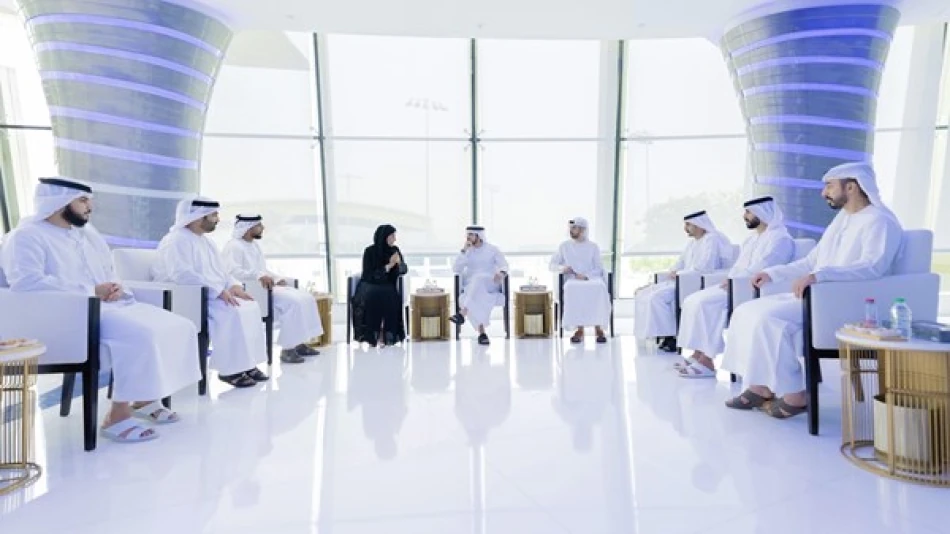
Sheikh Hamdan Praises Sheikha Hind's Family Program's Impactful Results
Dubai's Marriage Initiative Shows How Governments Can Drive Social Stability Through Direct Support
Dubai's ambitious family support program has achieved remarkable results in its first year, with a 218% surge in participation and over 700 weddings facilitated through government backing. The Sheikh Hind bint Maktoum Family Program represents a bold experiment in state-led social engineering, offering comprehensive financial, housing, and educational support to young Emiratis starting families—and it's working.
A Comprehensive Approach to Family Formation
Crown Prince Sheikh Hamdan bin Mohammed bin Rashid Al Maktoum's review of the program results reveals a sophisticated understanding of modern barriers to family formation. Rather than simply providing wedding venues, Dubai has created an integrated ecosystem addressing the real challenges young couples face: financial literacy, housing access, psychological preparation, and ongoing support.
The numbers tell a compelling story. The program now accounts for 27.7% of all registered marriages in the emirate, with 95% satisfaction rates among participants. The demographic sweet spot appears to be men aged 26-30 and women aged 20-25, suggesting the initiative is capturing couples at optimal life stages for family formation.
Beyond the Wedding: Long-term Investment Strategy
What distinguishes Dubai's approach is its focus on sustainability rather than spectacle. The "Start Right" program provides marriage rights education and communication skills, while financial literacy courses teach couples practical money management. The "How to Build Your Home" initiative guides couples through property acquisition—a critical factor given housing costs in major cities worldwide.
The practical benefits extend far beyond ceremony costs. Participants receive priority access to ready-built housing within loan categories, with 90% of program participants utilizing housing services. Special discounts on medical clinics, wedding supplies, jewelry, and travel create a comprehensive support network that reduces the financial burden of early marriage.
Global Context: State Intervention in Demographic Trends
Dubai's initiative arrives as governments worldwide grapple with declining marriage and birth rates. While Western nations debate child tax credits and parental leave policies, the UAE is taking direct action to remove barriers to family formation. This mirrors Singapore's comprehensive marriage and parenthood initiatives, but with greater emphasis on cultural preservation and national identity.
The program's success rate suggests that financial barriers, rather than cultural shifts, may be the primary obstacle to family formation in developed economies. By addressing housing, education, and startup costs simultaneously, Dubai has created a replicable model for demographic intervention.
Economic Implications and Scalability
From an economic perspective, the program represents significant government investment in human capital development. The 10-day remote work provision for newly married female employees acknowledges modern workplace realities while supporting traditional family structures. This balance between progressive employment policies and conservative social goals offers a template for other Gulf states.
The Dubai Community Development Authority's integrated approach—spanning venue provision, financial education, housing assistance, and ongoing support—creates multiplier effects throughout the economy. Wedding-related businesses, housing developers, and service providers all benefit from increased demand driven by government facilitation.
Measuring Success: Beyond Statistics
Director General Hessa bint Eisa Buhumaid's emphasis on the program as "an investment that starts from within the Emirati home" reflects a sophisticated understanding of social capital formation. The initiative's alignment with Dubai Social Agenda 33 positions family stability as foundational to broader economic and social development goals.
The program's evolution from launch in September 2023 to current scale demonstrates rapid iteration and responsiveness to demand. This agility in government programming contrasts sharply with bureaucratic approaches common in other jurisdictions.
Implications for Regional Competition
As Gulf states compete for young talent and seek to strengthen national identity, Dubai's family support model may influence regional policy development. The program's success in attracting participation while maintaining high satisfaction suggests other emirates and neighboring countries may adopt similar approaches.
The integration of traditional values with modern support mechanisms—financial literacy, remote work options, comprehensive healthcare access—creates a framework that could appeal to young professionals choosing between regional opportunities. This soft power dimension extends the program's impact beyond demographic statistics to talent retention and national competitiveness.
Most Viewed News

 Layla Al Mansoori
Layla Al Mansoori






